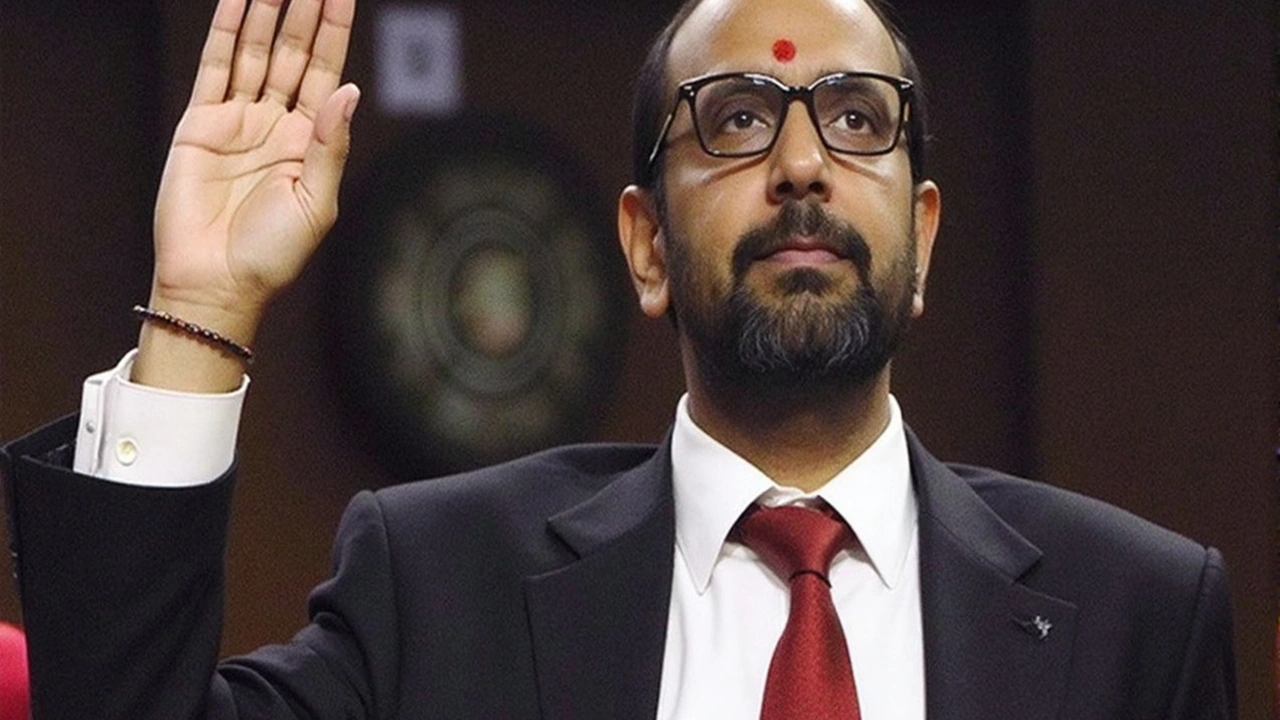In an intriguing twist for U.S. federal agencies, Kash Patel has become the first Indian-origin person to lead the FBI. Known for his close ties to former President Donald Trump, Patel doesn't shy away from embracing his Hindu roots. His personal story is one of cultural pride intertwined with a robust political career, showcasing a narrative that's rare in U.S. law enforcement leadership.
Patel’s journey started in New York, where he grew up in a Gujarati immigrant family. His parents, who fled from ethnic persecution in Uganda, instilled in him a deep appreciation for Hindu traditions. This upbringing plays a significant role in his life, and he’s never hesitated to share this cultural aspect publicly. During his Senate confirmation hearing, Patel made headlines by performing a traditional Hindu gesture—touching his parents' feet to show respect. Further connecting to his roots, he concluded his remarks with the devotional phrase "Jai Shree Krishna," honoring Lord Krishna in a way that resonated with many in the Hindu community.
Political Stances and Cultural Impact
Patel’s public endorsements further underline his connection to Hindu heritage. One of his noticeable stands involves the Ram Mandir in Ayodhya, India, where he has voiced strong support for its construction. Western media outlets have framed the temple in the context of Hindu nationalism, but Patel has defended the project by emphasizing its spiritual and historical importance to Hindus globally.
Distinctive personal touches, like wearing a rudraksh mala (sacred beads) and mauli (a sacred thread) on his wrist, are constant reminders of his faith. His Hindu identity often resonates with his political stance as a steadfast Republican promoting Trump's "America First" policies, illustrating how personal beliefs can dovetail with political ideologies.
Patel’s confirmation as FBI Director wasn’t without controversy. Opposition mainly came from Democrats who feared his close association with Trump might lead the FBI down a path of political bias. Concerns about his potential impact on the agency include worries about diminishing its independence amidst charges of partisan reshaping. Nevertheless, Patel's rise showcases the growing diversity within American politics and highlights how cultural identities are increasingly part of the national dialogue.

9 Responses
The ostensible celebration of Patel’s Hindu heritage constitutes a sophomoric distraction from the fiduciary responsibilities incumbent upon the bureau’s director. One must interrogate the epistemic framework that permits cultural symbolism to be conflated with operational competence. The deployment of rudraksh mala and mauli, while emblematic of personal devotion, should not masquerade as a panacea for institutional integrity. Moreover, the invocation of “Jai Shree Krishna” in a Senate hearing transgresses the secularist paradigm mandated by statutory doctrine. Such performative religiosity engenders a latent bias that could permeate investigative protocols. The academic literature on cognitive bias delineates how affective priming can subtly skew evidentiary appraisal. Patel’s affiliation with former President Trump further compounds the risk of partisan encroachment upon the agency. Empirical studies corroborate a correlation between political patronage and erosion of public trust in law enforcement entities. The Ram Mandir endorsement, though culturally resonant for some, dovetails with a narrative of Hindu nationalism that may alienate non‑Hindu constituencies. The interstitial nexus of religious nationalism and Republican orthodoxy warrants vigilant scrutiny from oversight bodies. It is incumbent upon the Senate Judiciary Committee to eschew tokenistic gestures and demand concrete safeguards against politicization. The mere presence of a cultural artifact on a director’s wrist does not obviate the necessity for rigorous adherence to the department’s apolitical charter. Evaluative metrics should be instituted to monitor any deviation from impartial investigative conduct. Transparency mechanisms, such as public reporting of case assignment statistics, could mitigate perceived conflicts of interest. In sum, the conflation of heritage celebration with executive authority constitutes a methodological flaw in governance. A rectified approach would prioritize jurisprudential fidelity over symbolic representation.
Patel’s cultural pride adds vivid color to the FBI’s mosaic but it shouldn’t eclipse the core mission of law enforcement. Let’s keep the focus on competence over ceremony.
The narrative surrounding Patel is undeniably captivating, and it offers a rare glimpse into the tapestry of American diversity. While some may fixate on the spectacle, it’s essential to recognize the genuine courage required to ascend to such a position. His public acknowledgment of Hindu rites can inspire countless individuals who see themselves reflected in high office. Yet, the discourse must remain balanced, celebrating heritage without obscuring the duties of the role. Ultimately, the conversation should honor both identity and responsibility.
The appointment indeed signifies a noteworthy development within federal leadership. It is prudent, however, to observe the procedural ramifications with measured decorum. Any intersection of personal belief and professional obligation warrants careful examination. Let us await empirical outcomes before forming definitive judgments.
One must commend the director’s initiative to integrate personal heritage into the public sphere, yet it is incumbent upon us to scrutinize the implications with scholarly rigor. The linguistic cadence of his statements reflects a deliberate intertwining of cultural symbolism and institutional authority. While the emotive resonance may be palpable, the procedural integrity of the Bureau demands unwavering neutrality. Consequently, a dialectical analysis is essential to ascertain whether such expressions constitute benign representation or a subtle encroachment upon the apolitical mandate.
Ah, the perspicacious Mr. Brown, ever the arbiter of grammatical sanctimony. One might suggest that an over‑emphasis on syntax distracts from the substantive concerns at hand. Nevertheless, your erudite phrasing does illuminate the gravity of maintaining procedural impartiality. Perhaps a modest dose of humility would complement your linguistic virtuosity.
Wow man the whole thing smells like a set up i swear they’re planting symbols everywhere. Think about it the rudraksh beads are a signal and the “Jai Shree” thing is a code. It’s like the deep state is using cultural stuff to push an agenda we dont even see. Wake up and look at the pattern before it’s too late.
Interesting development, let’s see how it plays out.
Patel’s ascent is a reminder that identity can be both armor and leash. The real test lies in the deeds that follow.